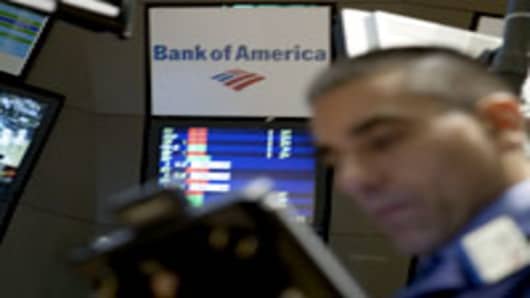Bank of America is running a big risk with its curt response to speculation earlier this week that it is the "big U.S. bank" that will be the subject of the next "mega leak" from WikiLeaks.
In an interview with Andy Greenberg of Forbes that was published on Monday, Wikileaks founder Julian Assange said that his website would publish documents establishing an "ecosystem of corruption" inside a "big US bank." Immediately, people began trying to figure out which bank would be targeted. For one reason or another, a lot of people suspected that the bank in question was Bank of America.
Things got really serious, however, when an interview Assange did with Computer World magazine in October 2009 was discovered. In that interview, Assange said he had "5GB from Bank of America, one of the executive's hard drives."
Sahil Kapur at Raw Story was the first to connect the dots, followed by Ryan McCarthy of the Huffington Post, Greenberg and NetNet.
The stock of Bank of America seems to have dropped on the news, losing 3.18 percent of its value on Tuesday.
Tuesday evening I spoke briefly with surprisingly terse Bank of America spokesman Scott Silvestri. He sent along a brief email with the bank's official response to the WikiLeaks story. I read the whole statement on the Kudlow Report Tuesday night, without attempting to interpret it. Here's what Silvestri sent:
"More than a year ago WikiLeaks claimed to have the computer hard drive of a Bank of America executive. Aside from the claims themselves, we have no evidence that supports this assertion. We are unaware of any new claims by WikiLeaks that pertain specifically to Bank of America."
If I'm reading that correctly, it sounds like Bank of America is attempting to cast a shadow of doubt over the idea that WikiLeaks has the documents from a Bank of America hard-drive. This is an incredibly foolish tactic. Assange has no possible motive for falsely claiming to have material from Bank of America. What's more, Assange has a proven track record of coming up with the goods. When he says he has a cache of documents, we can be confident that he really has them.
If anything, Bank of America damages its own credibility when it attempts to impugn the credibility of Assange. It makes the bank look petty and out of touch. It implies that the bank is engaged in wishful thinking rather than figuring out a strategy for dealing with the leak.
It's also deeply troubling that Bank of America says it has "no evidence" that Assange has the documents. I think that Bank of America is trying to say that Assange has not provided any evidence. But what it also means is that Bank of America's informational security is so compromised that the bank cannot tell whether or not Assange has a hard drive from one of its executives. Bank of America should know whether or not one of its executives hard drives has gone missing or been penetrated. Even if it didn't know this back in October of 2009, it's now had over a year to investigate the matter. But, as far as I can tell, no investigation occurred. Or, if Bank of America undertook an investigation, all it uncovered was an absence of evidence.
Even worse, it's clear from Bank of America's statement that the bank does not know what information is in the 5 gigabytes of information that Assange says he has. This means that the bank will be caught off guard if Assange releases the information to the public. The inability to prepare in advance for the disclosures all but guarantees that the response from Bank of America will be delayed and inadequate.
(It occurs to me that there's another possibility: Bank of America knows that Assange has documents and is actually preparing a defense. But that would make the "no evidence" claim an outright lie. I don't think Bank of America would resort to outright dishonesty.)
Finally, the last sentence of Bank of America's statement is just stupid quibbling. While it's technically true that Assange hasn't said anything lately about Bank of America, it's ridiculous for the bank to pretend that it cannot connect the dots in the way that everyone else in the world has. It makes them look a bit thick, frankly.
This kind of game playing is risky for Bank of America. If the documents are published and if they do show an "ecosystem" of corruption inside of Bank of America, its attempt to attack the credibility of Assange will only make the bank look worse. Its denial of the likelihood of a connection between the Computer World interview and the Forbes interview will show that the bank cannot be trusted to talk straight with the public. Its statement about "no evidence" that Assange has a hard drive will look like a lack of informational security. In short, Bank of America may have just made it's WikiLeaks problem even worse.
To be fair, I should throw in some boilerplate about how we still don't know that the Wikileaks documents definitely come from Bank of America. But that kind of thing drives me nuts. So I'll just quote what Greenberg said in his piece.
"To be clear, there’s no clear confirmation that the upcoming release will focus on Bank of America. Assange told me that he had unpublished, potentially damaging documents on multiple finance firms, beyond the bank 'megaleak' that we discussed," Greenberg wrote.
___________________________________________________
Questions? Comments? Email us atNetNet@cnbc.com
Follow John on Twitter @ twitter.com/Carney
Follow NetNet on Twitter @ twitter.com/CNBCnetnet
Facebook us @ www.facebook.com/NetNetCNBC



